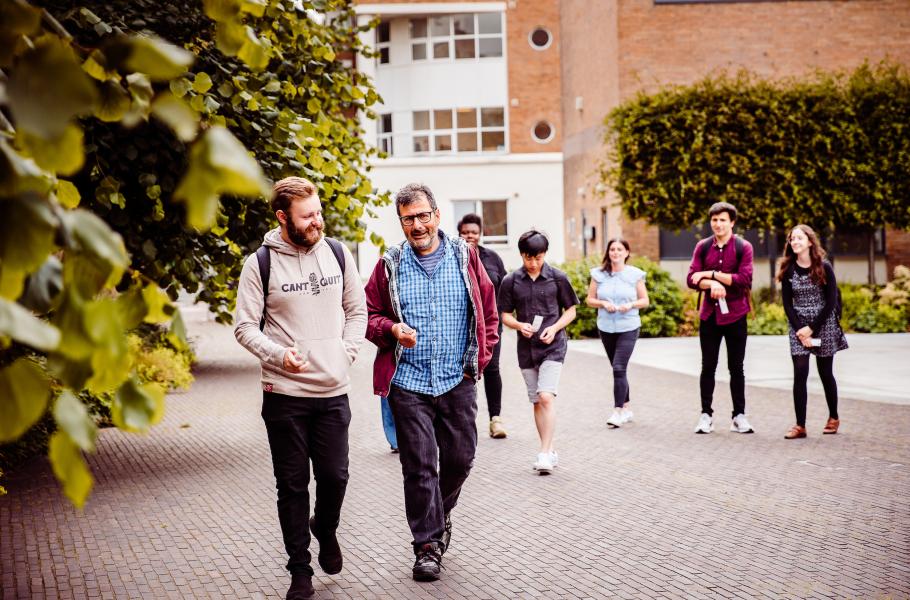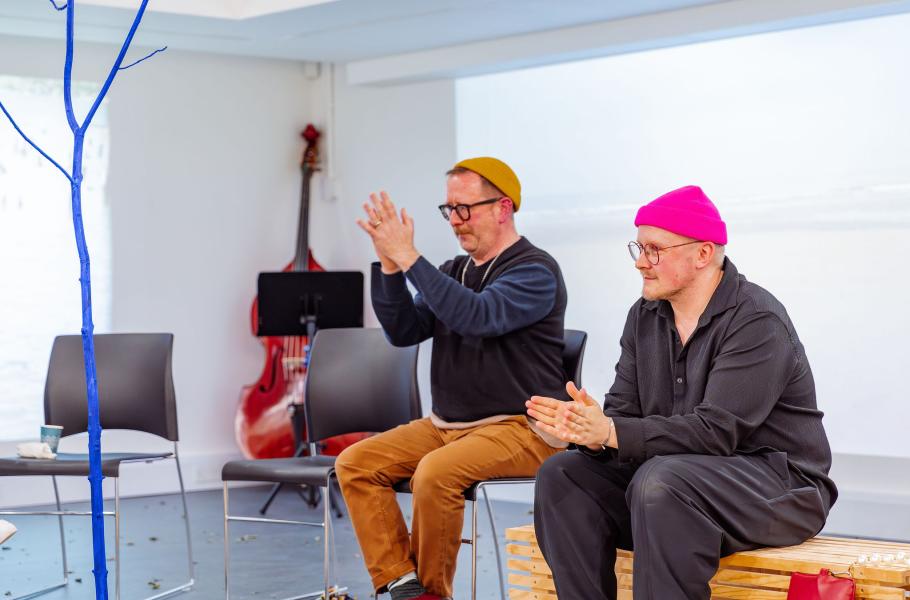Reviving the Archive: Theatre, Reenactment, and Revolution
Sam Rees and Gabriele Uboldi have created a show called Lessons on Revolution that is part of the Lancaster Arts spring season in 2025. This will be performed in the Jack Hylton room on February 14 and 15. (see What’s On for booking). Here Sam and Gabriele introduce the ideas that gave rise to the creation of this work.
Imagine you’re sitting in a theatre. Two performers switch on an old-style overhead projector and begin telling a story. They show a black-and-white photo of a young woman carried by police officers, banners in the hands of protestors, students sleeping in a university room. Piece by piece, they reconstruct an archive, bringing to life the story of radical students who occupied the London School of Economics over fifty years ago.
We are Sam and Gabs, the performers in question. Lessons On Revolution began as an idea born of frustration—with our unlivable flat, multiple jobs, and a world offering little hope. Inspired by a book, Voices of 1968: Documents from the Global North, we discovered the radical history of the LSE occupation, where students protested the university’s ties to apartheid regimes. This was exactly the kind of story we wanted to tell in a theatre—the story of people coming together with a shared vision, taking up space, and seeking change.
So, we began researching the LSE events, speaking to 1968 activists who had been there. We went to visit the LSE archive, unearthing documents from over fifty years ago. The archive held a myriad of different information-from detailed day-by-day accounts to seemingly random photographs, snapshots of a time and place.
As non-historians, our research process was a little unorthodox. At one point, we even (accidentally, we must say!) misplaced some of the archive’s carefully ordered materials. Yet, these missteps helped shape our understanding: the archives resisted neat narratives. The revolution didn’t succeed; the students went home. But through their struggle—and this is the important message we wanted to get across—new futures were imagined.
In other words, the documents we were reading expressed so much hope and had a real political momentum to them. Reading the students’ words fifty years later, we could feel a real sense of trepidation: to them, the revolution was a real possibility, it was just about to happen. But how could we translate this dramatic tension for an audience today, when all we had to show was black and white photographs and yellowed papers?
We decided that the only way to bring the archives to life was to cast the audience as the characters in our play. By sharing the stage with us, feeling the stakes of the 1968 occupations in their bodies, our audience experience history as a here and now—the possibility of the revolution, which until then lay dormant in the archive, becomes present.
We invite our audiences to ask: what survives beyond revolution? What can archives teach us about hope and collective action? When we ask these questions, the archive isn’t just a relic; it’s alive, part of us, and something we’re still creating.
The documents we unearthed at LSE are a testament to solidarity and the power of collective action. Lessons on Revolution is our contribution to this ongoing archive—a reminder that even in the absence of revolution, the act of coming together keeps hope alive.
Sam Rees is a playwright and theatre-maker. who has delivered acclaimed projects across the country to sell-out audiences. Sam's work has been praised by critics as 'a space for radical conversation to happen'. Gabriele Uboldi is an award-winning multidisciplinary artist and producer who has previously worked with the Barbican, the Young Vic, and Soho Theatre. www.gabrieleuboldi.com
As part of presenting Lessons on Revolution, Sam and Gabriele are also looking for stories about the university that we could bring to life from the 1960’s to yesterday. We welcome all stories, not just from students, staff or alumni. Perhaps you have taken part in activities over the years or been part of something that is no longer happening. We're particularly interested in hearing stories that may contain political or social themes - however you want to interpret that!
If you have any stories you’d like to share please get in touch with producers@lancasterarts.org




